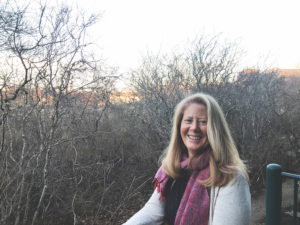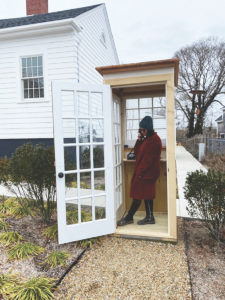
“I’ve had many lives,” Dawn Walsh says, and she’s not exaggerating. She’s been a kindergarten teacher and a massage therapist, worked with nonprofits, studied creative writing. Having moved to the Outer Cape in 2015 to work on summer programming at the Fine Arts Work Center, she is now a certified death doula, and is busy building more humane attitudes toward death and dying on many fronts.
Aside from working to launch Lily House, a proposed local comfort-care facility for the dying, she is the curator of the art installation Phone on the Wind, outside Provincetown Commons at 46 Bradford St., where people can communicate with loved ones who have died. It will have an opening reception on Saturday, Feb. 1, from 3 to 5 p.m. And Walsh will be presenting free sessions of her course, “The Art of Dying,” during Winter Wednesdays at the Provincetown Schools, from Feb. 5 through March 25 from 6 to 8 p.m. The first and last session of the Art of Dying will be a Death Café, an open discussion (with snacks) about the end of life, and she’ll be holding another Death Café at the Wellfleet Council on Aging on Monday, Feb. 24, at 1 p.m.
Walsh started a local celebration of Day of the Dead in Provincetown, replete with art projects, performances, and a parade, but because she’s been devoting herself to Lily House, she wasn’t able to continue that tradition in 2019.
A couple of pivotal events in Walsh’s life instilled her interest in death and dying. She was born in Salem, Ore.; spent her high school years in Lincoln City, Ore.; went to Oregon State to study education; and ended up as a kindergarten teacher in Seattle. Then, when she was in her late 20s, her mother died suddenly.
“It was a traumatic death,” Walsh says. She wasn’t able to see her mother before or after she died, and that had a devastating and alienating effect on her. “I saw the world differently,” she says. “I moved through the world differently. Everything about my life was turned upside down.”
She moved to Missoula, Mont., and got a second undergraduate degree in women’s and gender studies at the University of Montana. “I went to Missoula for refuge, for spiritual refuge, for healing, because of my mom’s death,” Walsh says. “It was not unlike the way so many of us are ‘called’ to live here in Provincetown. For me, Missoula and Provincetown are sister cities. They’re both towns that share a sensibility of people who live there intentionally, and of taking care of each other.”
From there she went to New York and Sarah Lawrence College for a master’s in women’s and LGBT history, and then Philadelphia, where she worked at a women’s rights organization. Why Philadelphia?
“I met a girl,” Walsh says. “It’s all about the girl. She was born and raised outside of Philly. First, we did a two-year stint in Maui, learning hula and surfing. I spent nearly 10 years in Philadelphia.” She got an M.F.A. in creative writing at Rutgers University-Camden and taught writing and LGBT studies there.

That’s when the other pivotal event in Walsh’s life transpired. “Two years before I left Philly, my good friend Linda died of a grand mal seizure,” Walsh says. “She was ready for this: she had had near-death encounters, and this time she just didn’t come back. She had her wishes in place, and they included having community-based after-death care and burial. Her body was taken to a funeral home, but we asked the funeral directors not to do anything — no embalming, no makeup, just keep her cool. The next morning, a group of her female friends, myself included, went to the funeral home and tended to her body. She was wheeled out to what would typically be the viewing room, and we very ceremoniously and ritualistically washed her body, brushed and braided her hair. We anointed her, and we dressed her, and the whole time talking to her, sharing stories with each other, interacting with her, honoring this physicality that gave life to the woman we knew as Linda. The profound experience for me was when Linda’s body was wheeled in and I just walked right over to her and laid hands on her and tended to her, as if I had been doing it my whole life. I had no idea I was so comfortable with death. There was something about being able to see a female friend and tend her body and her spirit in a way that I wasn’t able to do with my own mother. It was incredibly profound and healing, and it felt as natural as anything I had ever done.”
Linda’s burial was similar: no coffin, just a tapestry to shroud the body, and her friends and family hand-filled her grave. The experience changed Walsh’s life. “It felt like an awakening of a part of me that had been living in me my entire life,” she says. “I just didn’t know it was there.”
Things fell into place after that. Walsh moved here for the job at FAWC, and Pat Oleszko, a performance artist who was teaching at the work center, helped her come up with the Day of the Dead celebrations.
“My own personal practice as an end-of-life doula started with me becoming a hospice volunteer on the Outer Cape,” Walsh says. And that led to Lily House. She joined the town’s cemetery commission to push for green burials. And then there are the Death Cafés and Phone on the Wind.
“I tapped into this whole experience of death here,” Walsh says. “More than the average town, Provincetown holds a collective experience of death. Just historically, being aware of all the men and some women who died at sea, and how those deaths profoundly affected the community. Even farther than that, the Wampanoags — that death is held by this land. All of the gay men who came here to die during the AIDS epidemic.”
For Walsh, it’s a reflection of what’s good about the place. “I feel like in my first year of living here, I made more friends and deeper friends than 10 years of Philadelphia,” she says. “There are a lot of deep feelers and thinkers. It’s a very spiritual place, conducive to healing. You can do it in a place of natural beauty that holds you, and you’re surrounded by a community of people who support each other to be the best we can be.”



